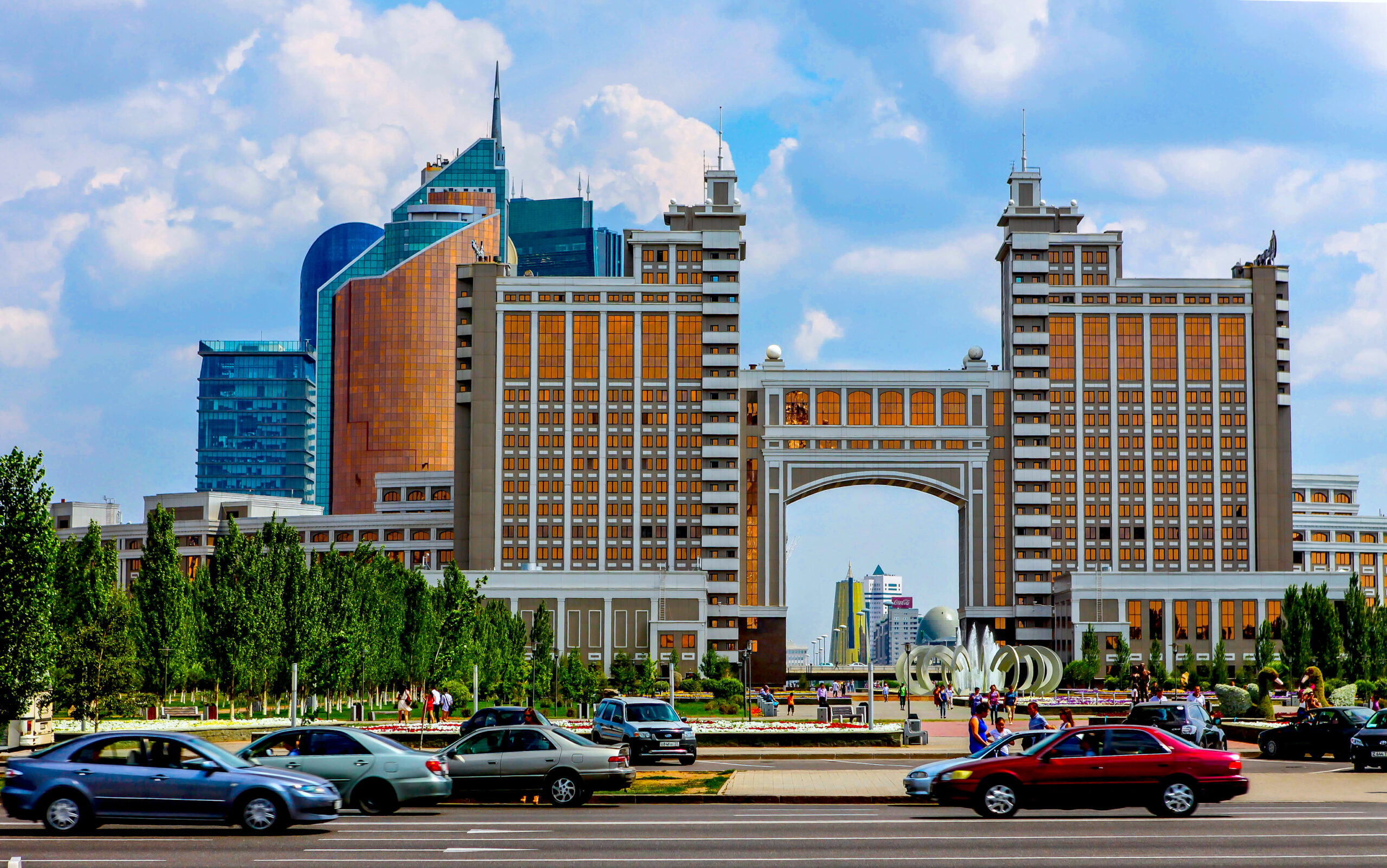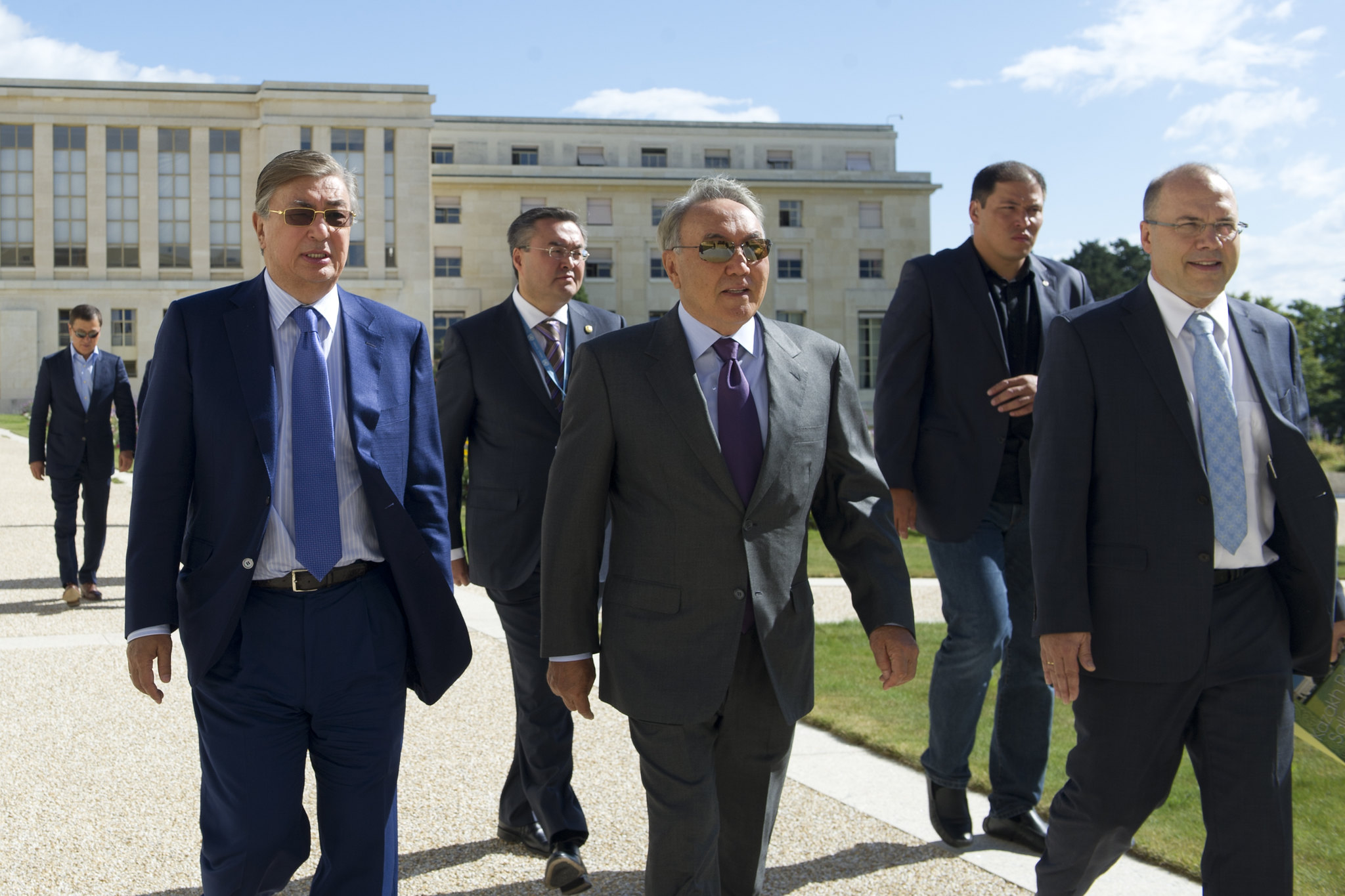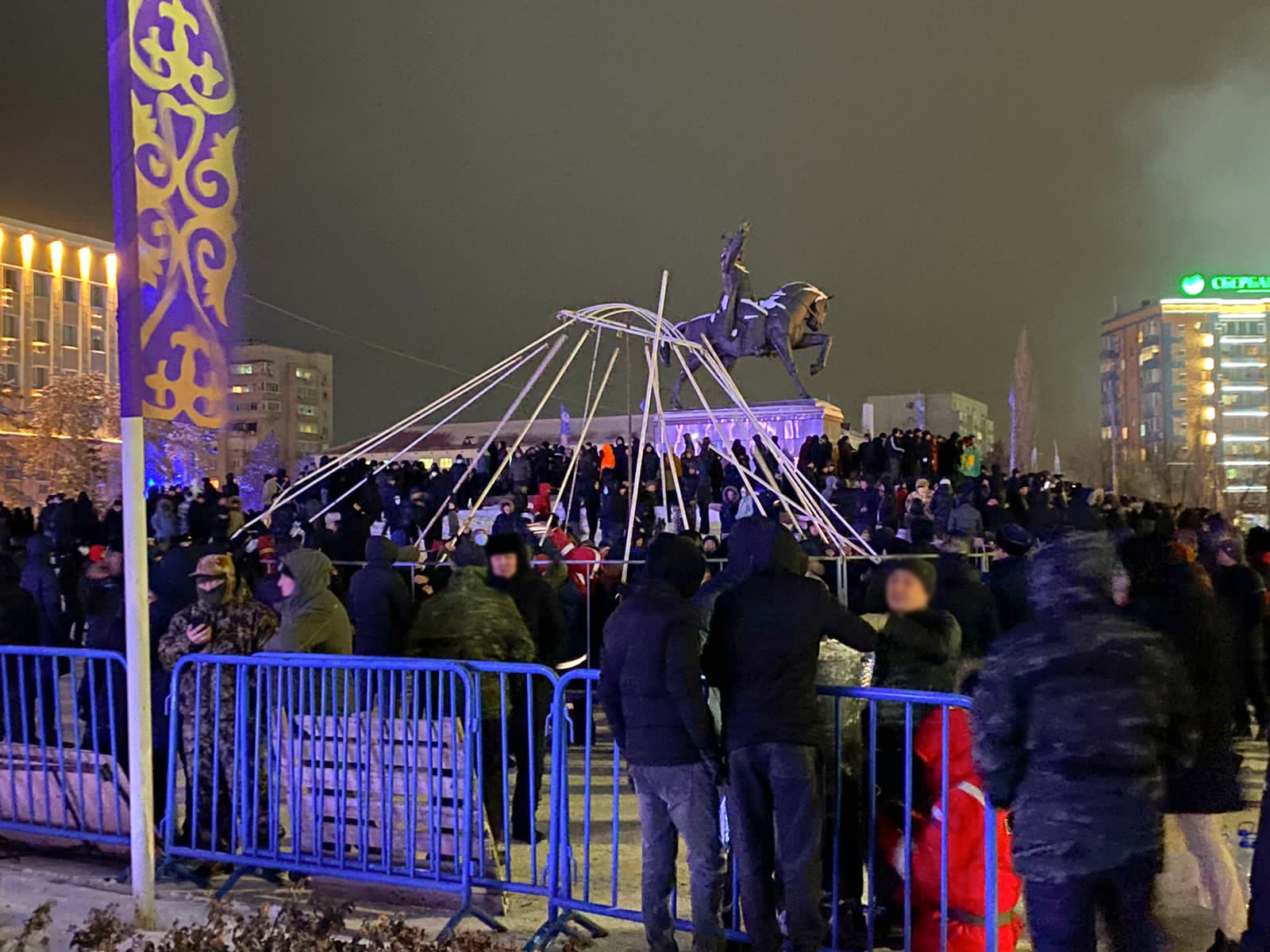There’s great temptation for Washington to get involved, says Anatol Lieven, whether it be driven by the pro-democracy industry or to cause trouble for Russia and China.

Headquarters of KazMunayGaz, or KMG, the state-owned oil and gas company of Kazakhstan in the capital city of Nur-Sultan. (Ninaras, CC BY 4.0, Wikimedia Commons)
By Anatol Lieven
Responsible Statecraft
 Despite Russian hints, there is no evidence that the United States was involved in the latest violent protests in Kazakhstan. However, there now exists a strong temptation for America to get involved — and it is a temptation that must be firmly resisted by the Biden administration.
Despite Russian hints, there is no evidence that the United States was involved in the latest violent protests in Kazakhstan. However, there now exists a strong temptation for America to get involved — and it is a temptation that must be firmly resisted by the Biden administration.
Aspects of the latest unrest remain unclear. It has been suggested that it was partly caused by struggles within the Kazakh elites between supporters and opponents of former President Nur-Sultan Nazarbayev, who until this week retained considerable power over the government.
The most important underlying reason for the unrest however is entirely clear. It lies in the gross mismatch between Kazakhstan’s huge revenues from energy exports (more than $30 billion in 2021), the vast wealth of its elites and the poverty of the mass of its population, with an average household income last year of only $3,200. As a Kazakh trades unionist told The New York Times:
“Kazakhstan is a rich country, but these resources do not work in the interests of the people, they work in the interests of the elites. There is a huge stratification of society.”
Regional factors also played a part: the hugely expensive move of the capital from the biggest city, Alma Aty, to a new capital, Astana, then renamed — to add insult to injury as far as Alma Aty is concerned — Nur-Sultan after Nazarbayev. The failure to distribute the benefits of energy revenues to the western region of Menghystau where most of the oil and gas is produced is also a factor. The government decision (now suspended) to lift the cap on domestic fuel prices was only the last straw for many ordinary Kazakhs.
The temptation for the United States to become involved in backing unrest in Kazakhstan stems from two sources (apart from the innate tendency of the democratism industry in the West to idealize any protest against an authoritarian regime as “democratic” and to lend it unthinking support). First of course is the desire to make trouble for Russia. Already, while U.S. Secretary of State Anthony Blinken has criticized Russia’s dispatch of troops to Kazakhstan, sections of the Western media and commentariat are celebrating the diversion of Russian military force and attention from Ukraine.

July 27, 2015: President Nursultan Nazarbayev, center front, visiting the Kazakh room at the Palais des Nations, Geneva. (UN Geneva, Violaine Martin)
The second motive lies in a desire to make trouble for China. One important part of China’s Belt and Road network is intended to run through Kazakhstan. China has invested heavily in Kazakhstan’s infrastructure and created a free trade zone and transport hub at Khorgos on the border with Kazakhstan.
Kazakhstan borders on Chinese Sinkiang, and a large part of Sinkiang’s population is ethnic Kazakh. Over the past year, the Kazakh government has had to make intensive efforts to prevent anger within Kazakhstan at China’s repression in Sinkiang from boiling over into mass protests.
Support CN’s Winter Fund Drive!
If the Kazakh government collapses or is gravely weakened, it would be very surprising if hard line elements in Washington did not see this as an opportunity to use Kazakhstan as a base to undermine Chinese rule in Sinkiang — even if (as in Syria) this led them into de facto alliance with Islamist extremist forces.
Crime & Blunder
For America to use Kazakhstan in this way would be both a crime and a blunder, that would recall the worst aspects of U.S. policy in Africa, Asia, and Central America during the Cold War. It would in fact cast America in the role in which American commentators like to cast Russia — that of a cynical troublemaker, absolutely indifferent to the consequences of its actions for unfortunate populations on the ground.
Kazakhstan’s permanent and inescapable geopolitical position was well summed up for me by a Kazakh official back in 1995, when America was seeking expanded influence in Central Asia. He said that of course the Kazakh government wanted U.S. investment and good relations with the United States but:
“You have to understand that every sensible Kazakh has a map in his head. What that map shows is that Russia is there, and China is there, and Kazakhstan is in the middle. And America does not appear anywhere on that map.”
An even more morally and politically serious reason why Washington should not seek to weaponize unrest in Kazakhstan against Russia and China relates to Kazakh ethnic nationalism. The greatest achievement of the Kazakh regime since independence has been to consolidate Kazakh independence and national identity without inspiring ethnic chauvinism against the country’s Russian minority. Moscow in turn has never sought to encourage that minority to revolt.
The potential for ethnic conflict however remains enormous. In August of 2021, criticism from Russia led the Kazakh government to take action against “language patrols” of Kazakh nationalists forcing shops to use the Kazakh language and humiliating Russians in public for not speaking Kazakh.

Protesters setting up a yurt in Aktobe, Kazakhstan, Jan. 4. (Esetok, CC BY-SA 4.0, Wikimedia Commons)
Under both Russian imperial and Soviet rule Kazakhstan was exposed to repeated waves of Russian and Ukrainian settlement and state repression, until by the 1960s ethnic Kazakhs were a minority. During the famine of the early 1930s caused by Stalin’s collectivization of agriculture, Kazakhs suffered proportionately more deaths than any other Soviet nationality. Since the 1980s, the decline in the Russian birth rate and Russian and other European migration from Kazakhstan has reduced the European minorities to just over 20 percent; but Russians still form the majority in the far north of the country.
The absence to date of ethnic conflict in Kazakhstan reflects two other, crucially important patterns in post-Soviet history. The first is that Vladimir Putin is a Russian state nationalist in the old Russian imperial and Soviet tradition, dedicated to Russian power (naturally, as embodied in the person of Vladimir Putin) but he is not a Russian ethnic nationalist. This is evident both from his own writings and the thoroughly multi-ethnic character of his regime. The second is that rather remarkably, among all the instances of mass ethnic violence that followed the fall of the U.S.S.R., none were directed against ethnic Russians outside Russia.
The United States has backed anti-Russian ethnic nationalism in the Baltic States, Ukraine and elsewhere, but this has never taken the form of ethnic pogroms. Given the violent events of the past week in Kazakhstan, there can be no confidence at all that further protests in Kazakhstan may not take the form of ethnic chauvinism and attacks on ethnic Russians.
Small-scale violence and the threat of it against Russians did occur in Kazakhstan and elsewhere. Thus in 1992, I interviewed a Russian engineer who had fled that year from a town in southern Kazakhstan (where Russians were already a small minority). He said that every evening when he walked home from work, Kazakh youths would fall in step with him and tell him that if he and his family did not leave, they would rape his daughters.
“I did not know if they really would have. As far as I know, I was not unpopular,” he said. “But the risk was there. And above all, I knew that if that happened, the Kazakh police would have done nothing. So we left.”
The deployment of Russian troops to Kazakhstan to support the government is likely to increase anti-Russian feelings; and if, God forbid, ethnic violence does erupt in Kazakhstan, it could help to produce a future Russian government far more chauvinist than that of Putin. This would be a disaster for Russia, Russia’s neighbor, and above all Russia’s own ethnic minorities. And if Washington were seen to be supporting violence against ordinary Russians, then America will be faced in future with a danger far more formidable than that of Putin: an infuriated Russian nation.
Anatol Lieven is senior research fellow on Russia and Europe at the Quincy Institute for Responsible Statecraft. He is author of several books on Russia and its neighbors including The Baltic Revolutions: Estonia, Latvia, Lithuania and the Path to Independence and Ukraine and Russia: A Fraternal Rivalry. His book Pakistan: A Hard Country is on the official reading lists for U.S. and British diplomats serving in that country. His latest book, Climate Change and the Nation State, was published in March 2020 by Penguin in the U.K. and Oxford University Press in the U.S.
This article is from Responsible Statecraft.
The views expressed are solely those of the author and may or may not reflect those of Consortium News.
Support CN’s
Winter Fund Drive!
Donate securely with PayPal
Or securely by credit card or check by clicking the red button:


The Russians definitely think this was a ‘Maidan’ type incident and that implies US/CIA involvement.
Also, the cavalier treatment of the Xinjiang problem marks a definite bias on the part of Mr Lieven. While these Kazakhs he mentions were definitely imprisoned, the author implies there was no cause and denies Chinese jurisprudence. There really has been intense jihadist activity in Xinjiang apparently involving all sorts of ethnic Muslims, not only Uyghurs. For China, this is a proven existential threat, while measures to contain it do not seem to involve killing extremists. I choose to believe the Chinese government when they claim to work to improve the lives of the affected people.
Additionally, we know some Kazakhs are vulnerable to Muslim extremism; we also know that the CIA has used these men as shock troops in the past; we know that color revolutions are usually Western led. Thus, a pattern develops.
Pepe Escobar wrote last week that his sources suggest MI6 provided comms tech to get around the internet shutdown which made possible national coordination among “protestors”, thereby allowing the action to spread so rapidly across what is a rather large country.
Color revolutions always use existing tensions as cover, opening up the door to deep but narrow analyses like this one, that further shield the imperialists.
The dye on this color revolution, however, has faded.
Putin came, saw, and said, “Yankees go home.”
How can you say, “. . . there is no evidence that the United States was involved in the latest violent protests in Kazakhstan”???
I have a bridge I want to sell you.
Here’s just some of the evidence readily available straight from the horse’s mouth, the NED: hXXps://youtu.be/GMtOme-J3D4
There is no evidence that the United States was involved in the latest violent protests in Kazakhstan – A likely story!
Hunter Biden’s ‘close friend’ charged with treason in Kazakhstan
hXXps://www.washingtonexaminer.com/news/white-house/hunter-bidens-close-friend-charged-with-treason-in-kazakhstan
Hunter Biden also had business dealings in Kazakhstan: report
hXXps://nypost.com/2020/10/17/hunter-biden-reportedly-also-had-business-ties-in-kazakhstan/
I appreciate the different perspective the posts of Lieven and Murray bring to CN. It is interesting that authoritarian strongmen keep the lid on ethic divisions as effectively as they do (think Saddam, Assad, et.al.). We have proved time and again we are good at going after the strongmen who irritate us long enough for any number of reasons, and how completely inept we are at bringing a just and equitable society from the ruins we create in the process. Whatever Kazakhstan’s troubles are we aren’t the solution. I’m only speculating that Putin knows he isn’t either.
You forgot the third source of temptation for the U.S. to get involved in Kazakhstan. OIL.
Almost everywhere the U.S. has gotten politically and militarily involved, the primary motive was the exploitation of that region’s natural resources.
But Washington started these unrests in the 1st place like all over tis planet it can be recognized just like in Hongkong!
“Despite Russian hints, there is no evidence that the United States was involved in the latest violent protests in Kazakhstan.”
The US is as uninvolved with what was attempted in Kazakhstan last week as it was in the Syrian color-revolution (unsuccessful after hundreds of thousands of deaths and millions displaced) or the ones in Libya and Ukraine (successful).
I don’t think that the US will be allowed the opportunity.
As to no involvement by the US? I recommend you go over to RT and look at what on-lookers saw and described. An otherwise calm protest was clearly hijacked.